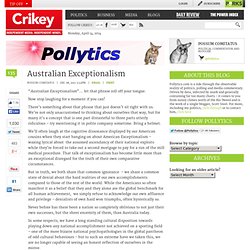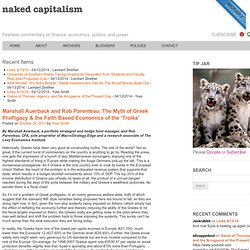

Australian Exceptionalism. “Australian Exceptionalism”…. let that phrase roll off your tongue.

Now stop laughing for a moment if you can! There’s something about that phrase that just doesn’t sit right with us. We’re not only unaccustomed to thinking about ourselves that way, but for many it’s a concept that is one part distasteful to three parts utterly ridiculous – try mentioning it in polite company sometime. Growing Gap. Fear of Contagion. How exposed are the economies of the Middle East and North Africa to the euro-zone crisis?

With economic instability in Europe and political instability at home, MENA states are more vulnerable than ever, particularly the already weak economies of Tunisia, Morocco and Egypt. How to get into and out of an economic crisis... - Andri Snær Magnason. From Scandinavian democracy to target of British anti-terror laws: the whole world knows about the Icelandic crash, but how did the country get itself into such a mess?

Andri Snær Magnason tells a saga of privatizations, overreaching and astronomical pay checks. Iceland is like a human experiment. Leave 300,000 people on an island and see what happens. In many ways, Iceland is a strange place, and what happens in Iceland on a small scale can reflect far bigger forces in this world. Marketing experts sometimes use Iceland to test-run products or marketing campaigns – of course without letting us know. In Greece, Barter Networks Surge. Marshall Auerback and Rob Parenteau: The Myth of Greek Profligacy & the Faith Based Economics of the ‘Troika’ By Marshall Auerback, a portfolio strategist and hedge fund manager, and Rob Parenteau, CFA, sole proprietor of MacroStrategy Edge and a research associate of The Levy Economics Institute Historically, Greeks have been very good at constructing myths.

Euro Crisis Pits Germany and U.S. in Tactical Fight. Thierry Roge/Reuters Chancellor Angela Merkel of Germany, shown in Brussels on Thursday, views the financial industry with profound skepticism.

Asia.
Up and Coming. Saudi Arabia’s stock market Saudi Arabia’s stock exchange gained nearly $12 billion in market capitalization during the first weeks of January, offsetting combined losses in all other Arab stock exchanges, and maintaining the region’s market capitalization at $879 billion.

Building on the momentum, Saudi Arabia now wants to open the exchange to direct foreign investment for the first time. The Saudi Stock Exchange hopes one day to compete with major markets The last year has been difficult for Gulf stock markets. The pressure of uprisings in the Middle East as well as Europe’s worsening debt crisis have taken a heavy toll.
Yet despite these pressures and forecasts that in 2012 Arab stock markets (bar Saudi Arabia) will continue their downward trend, Saudi Arabia’s market, the Tadawal, gained nearly $12 billion in market capitalization during the first weeks of January. The Tadawal is worth $341 billion. Paula Mejia Paula Mejia is a contributing writer for The Majalla. Ikhwanomics. The Muslim Brotherhood has a plan for Egypt’s economic recovery The Ikhwan’s economic manifesto to overhaul Egypt’s collapsing economy charts a pragmatic course between state-run economics on the left and crony capitalism on the right.

But given the scope of the economic challenges before it, arguably the biggest thing the world has to fear from an Islamist-run Egypt is that its leaders don’t have the answers, either. Salafists protest against IMF Managing Director Christine Lagarde's visit to Tunisia. The Freedom and Justice Party in Egypt will have to contend with the hardline Salafist element in parliament. "Egypt’s Broken Economy" by Mohsin Khan. Exit from comment view mode.

Click to hide this space WASHINGTON, DC – Egyptians’ political aspirations have dominated the country’s public life since the fall of President Hosni Mubarak last year. Unfortunately, as those aspirations are addressed, the economy has entered a steep decline, jeopardizing one of the revolution’s main goals, namely improvement in Egyptians’ living standards and welfare. Indeed, the populist rhetoric of Egyptian politicians threatens to undo the economic reforms undertaken by the Mubarak regime. In 2004, a major reform program was launched under former Prime Minister Ahmed Nazif. The 2004 reforms, with their elimination of restrictions on access to foreign exchange and reduction of import tariffs, gradually improved the business and investment climate. Africa Takes Off - By G. Paschal Zachary. Sacrificing Their Lives to Work by 72migrantes.com. When it was established in the late nineteenth century, Labor Day was intended to honor the American working man.

Yet a great deal of our menial labor today is performed not by American citizens but by undocumented migrant workers—many of whom risk their lives in thousand-mile journeys simply to get to the United States. A year ago this August, 72 of those migrants—58 men and 14 women—were on their way to the US border when they were murdered by a drug gang at a ranch in northern Mexico, in circumstances that remain unexplained.
Since then, a group of Mexican journalists and writers have created a website, 72migrantes.com, to commemorate each of the victims, some of whom have never been identified. What follows is a selection of English translations of their work.